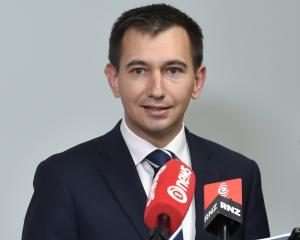Minister Ayesha Verrall met Waitaki District Mayor Gary Kircher, deputy mayor Hana Halelele and Waitaki Health chief executive Keith Marshall to discuss the issues the hospital was facing and its history.
She later held a public forum alongside Waitaki Labour candidate Ethan Reille, speaking on the state of healthcare and taking questions from the public, ranging from vaping reform to eating disorders.
The main topic of the meeting was the hospital, which has struggled with staff shortages in recent months and was forced to close the emergency department three times within a six week period. The closures were followed by an announcement from local GPs they had stopped after-hours service.
Dr Verrall said work on the financial sustainability of the hospital was "actively under way" between it and Te Whatu Ora Health New Zealand (HNZ).
"I want to see those discussions reach a conclusion."

She was impressed by the relationships between the hospital, local government, HNZ and other healthcare providers.
"That’s the basis for continuing to improve the sustainability of the service."
The pressure on the emergency department was not an easily solved issue, as it was intertwined with the rest of the health system.
Ultimately the issues the hospital was facing were national level problems, such as a lack of hospital staff and general practitioners.
More doctors had been employed by the hospital to help resolve emergency department issues, she said.
When asked if it was time to consider the government taking ownership of Oamaru Hospital, she said it was not for the government to decide.
"In some cases the community is very proud of their independence ... we have to respect that."
If the council did want to exchange ownership, the government would "have to consider it".
"From the government’s point of view ... all New Zealanders should be entitled to the same standard of health service."
There had been a lot of historic arrangements and inconsistencies between hospitals and health authorities which had led to issues.
"In Oamaru’s case I think it hasn’t been fairly funded for the service that it was offering."
Mr Marshall said the question of if it made sense for the hospital to be owned by the council was up for debate, but it was secondary to the problems it was facing.
More funding would help, but it would not fix the outdated service model it was operating on.
The types of service and volume of patients it handled was not true to the model it was based on.
"We are dealing with the ghost of a funding model established in the ’90s."
An example was how it was funded for 4000 emergency department patients each year, but it handled about twice that.
Handing it over to the government would also not help, as the exact organisational structure of the hospital mattered less than the actual services it provided.
"The only thing that really matters is the patient gets the care they need."
What the hospital did need was a proper assessment of the levels of service and how they were provided. An extensive review of the level of services and healthcare model was submitted to the Southern District Health Board in 2016-17, but it was never implemented.
The hospital was actively working on a review of its services with HNZ.
In regards to the emergency department closing, hospital management met with HNZ and determined it must not allow it to close again, he said.
Although it had appointed more doctors, the most important thing was to ensure there was good support for locum doctors.
Mr Kircher said while it was "really encouraging" the minister had come to listen to their concerns, "the visit did not fix the national doctor shortage".
It did, however, give the council an opportunity to explain the issues and how they had come about.
It felt like there was a "real desire to co-operate."
He hoped to keep the hospital locally owned, as he believed there were many benefits.
Waitaki Health was more aware of local issues and could target them without getting central government involved.
However, the council was "not so ideologically bound to owning it" that it would refuse if exchanging ownership would be better for the community.












